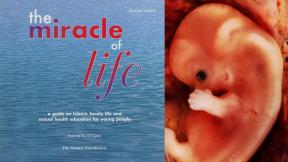
The smiling school nurse held up the package of multicolored pills and asked if we knew how to use them. One of the girls sitting in the front of the class gave a clear one to two minute explanation of this. What became evident was that these were not pain killers for headaches.
They were birth control pills.
I was fifteen. This was the sex education component of my grade ten Moral and Religious Education class.
While there was plenty of “education” given about the topic to the class of teenage boys and girls (during one class, there was even a demonstration on a wooden model of how a male condom should be used), there was nothing particularly “moral” about it.
Fact: Sex is part of the school curriculum
Whether parents accept it or not, this information is part and parcel of their child's public school experience. It is also the experience virtually all of the 99 percent of Muslim kids in North America who attend public schools.
Across the U.S. discussion of sexuality usually falls under the course “Family Life Education”. The sexual component tends to be discussed more openly in high school.
“Sex education is only one component of it,” notes Sharifa Alkhateeb, who sat on the Fairfax County Public Schools' Family Life Education committee in Virginia between 1990 and 1992. She is also president of the Muslim Education Council, which educates administrators and educators about Islam and Muslims.
“An underlying concept in Family Life Education is that the child is an individual first and foremost and that they should be pleasing themselves and establish their own personal identity,” Alkhateeb explains.
While this in itself is not always negative, when this type of thinking is extended to sex, it means pleasing yourself first, with little emphasis on right and wrong.
Most public school sex education works on the premise that kids are going to have sex anyway, so why bother teaching them right and wrong about it. Instead, give them the tools to have “safe” sex. This of course includes the now notorious distribution of condoms in schools, as well as teaching kids about various birth control methods, like the pills.
This way they will be “protected” from AIDS and pregnancy. There is little to no talk of the emotional and psychological scars left by sex outside of marriage, let alone the right and wrong of it. There is no discussion about the other health risks associated with sex outside of marriage that condoms do not protect against.
“Condoms do not provide protection from many of the sexually transmitted diseases,” explains Marilyn Morris, president and founder of Aim for Success. The organization promotes abstinence from sex through speeches and presentations to students in grades six to 12. The group is one of the largest providers of abstinence education in the U.S.
“For example, the human papilloma virus, commonly called [HPV], is the most common sexually transmitted disease in America and it's killing thousands of young women each year and yet the condom provides little to no protection from this incurable sexually transmitted disease,” Morris notes.
She says the message of Aim for Success is that “sexual abstinence before marriage is all about freedom. If you are not having sex then you are free to go on with your dreams and goals but you're also free from sexually transmitted diseases, you're free from pregnancy, you're free from the emotional scars of lifelong painful memories.”
But the abstinence option is merely presented as an option amongst many for young people to choose from in public school sex education when deciding the course of their sexual activity. In fact, it is probably the least discussed one.
Sex education is reinforced by the school and surrounding culture
Aspects of the public school sex education are reinforced by the school and surrounding culture.
For example, Alkhateeb points out school teachers and administrators may try to involve Muslim children in dances and dating because, “they cannot conceive of a way of living where that is not a major part of life.” She adds that this is usually done with good intentions, with teachers and counselors, for example, thinking they are helping the child.
However, Alkhateeb says the danger is that this can sometimes go so far as teaching the kids to be alienated from their parents, who are perceived as immigrants who don't understand American culture and the need to fit in with peers and have a good time.
Movies, television, even some cartoons glorify sexual relationships outside of marriage. There is clearly pressure from friends and peers at school in some cases to date and have sex outside of marriage.
Teaching homosexuality in public school sex education
While sex education does focus on issues like biological changes in adolescents and birth control, for instance, one component that has become more common as well is the teaching of homosexuality as a “lifestyle alternative” that is just as legitimate as the heterosexual married family unit.
While this may come as a shock to many Muslim parents, the fact of the matter is that for at least some children in public schools, who may even be the friends of Muslim children, this is a reality.
“The friend will say ‘I have two mommies or two daddies' if that's the reality of that child,“ says Khadija Haffajee, a retired school teacher from the Ottawa-Carleton region of Canada. She has spent about 30 years working in the public school system.
This is also the case for unlawful heterosexual relationships.
“It's not just homosexual relationships, it's adulterous relationships,” explains Haffajee, “kids will say ‘my mother's boyfriend or my father's girlfriend.”
Opting out of public school sex education
“With what I see of the curriculum nowadays I would advise parents not to expose their children to it,” says Shahina Siddiqui, a Winnipeg, Canada-based social worker.
She says the graphic language used to teach about sex, physical demonstrations of applying a condom, the diagrams used, the fact that male and female students are paired off in classes together and that overall message is ‘hey all this is normal, if you're not doing it [sex], something is wrong', is enough for any Muslim parent to get their child out of the class.
But that leads to the next question.
Sex education: Whose responsibility is it anyway?
“For me, it's a parental responsibility,” says Haffajee.
She stresses the need for Muslim parents to be educated themselves about sex education before going to their children's schools to protest or discuss its contents.
“We in North America, need to address the issue from a parental point of view,” she says. “We need to provide parents with information before we hit the school system because this has been a taboo subject [amongst Muslims] and we have to get rid of it [the taboo]. We need to have Islamic education, forums where Muslim parents get together.”
Many Muslims fear of the “S” word
“Muslims shy away from using the word s-e-x on their tongue,” Ahmad Sakr, author of The Adolescent Life, tells Sound Vision. The book talks about, among other things, youth in Islam, modesty, social behavior, abortion, the prom and dancing and drinking.
This is not the case with younger Muslims though.
“The youngsters who were raised here do not feel awkward in using the word sex, to write about it or to talk about it, rightly or wrongly. To the parents, even wrongly, they say [it's a] taboo.”
One of Sakr's books, Matrimonial Education in Islam, was almost not published because it was originally entitled Sex Education in Islam. It was published after the title was changed.
”Parents are too shy to speak on this subject to their children. They tell them take the book of Dr. Sakr entitled Matrimonial education and you'll learn more,” he says.
Sex education: Not just mom's job
Haffajee stresses that if parents decide to give their kids sex education themselves, it is not a responsibility that should fall solely on mothers' shoulders.
“I think the fathers need to know, not only mothers, and we should have people speak to them about the Islamic perspective on sex education, how the Prophet Muhammad (peace and blessings be upon him) used to openly address these issues.”
“If early Muslims, starting with the Prophet himself were much more open in discussing what we now consider private subjects, then they must have had the right idea and we have the wrong one and the questions and answers you find in the Hadith prove it,” notes Alkhateeb
While cultural taboos and embarrassment may make many parents reluctant to discuss sex with their children, they should remember that the kind of sex education their children receive in public school is reinforced by the surrounding culture.
This wave of pressure has to be countered by Islamic sex education at home or within the community.
For those who are really uncomfortable talking to their kids about the topic, Sakr suggests that they “request someone neutral from the community, professionally well groomed, ethically and morally committed to be invited to speak on this subject.”
This kind of a session, he suggests, could start off with a presentation to an audience of both sexes, but a question and answer section afterwards that is separate: one for boys, one for girls, so they feel more comfortable.
The possible dangers of non-involvement
Marilyn Morris started Aim For Success in 1993 based on her own experience of receiving no sex education as a teenager in the 1960s. This partly led her to getting pregnant at the age of 17.
“I was a good girl, I came from a good home, I was in church every Sunday and I got pregnant my senior year in high school,” she recounts. She and her boyfriend married before the birth of her baby, and they are still married today, 30 years later. Her husband, Chuck Morris is also involved with Aim For Success.
“We're convinced that if somebody had talked to us we would have listened,” she says.”But back then nobody was talking about sex. Nobody talked about it at home, nobody talked about it at school and church.”
The only place it was talked about, she notes, was amongst kids.
“The only message I heard back then from my friend was that sex is no big deal, everyone's doing it and nobody gets hurt.”
“I learned the hard way sex is a big deal and there's a huge price to pay.”








Comments
I enjoyed a lot reading the stuff present in this web site. I will surely come back to this website again and again.I enjoyed a lot reading the stuff present in this web site. I will surely come back to this website again and again.
Location
great site
Location
Really good article, thanks for sharing.
Location
so far i liked this website, but it would be so great to give choice for others readers to rate comments of other users. Fortunately this is very appropriate and knowledgable site and *report abuse* to some vulgar comments will be another contribution of receiving right information on sex education inshalla. Thanks.
Location
I think that sex education in public scools in the United States is not skewed as severely to the contraceptive side as this article presents it to be. The U.S. actively financially supports abstinance-only programs that promote abstinance as the best way to psychologically and physically protect yourself from the dangers of premarital sex. There are programs that do teach methods of contraception (the most liberal of these being in Califronia), but they are normally supliments to abstinance programs. I have yet to hear of a school that actively promotes contraception over abstinance as a better policy for teenagers.
Location
Add new comment